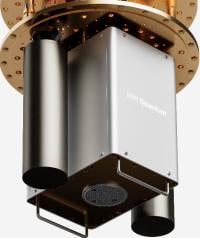If you’re placing bets on whether quantum computing or high-performance computing (HPC) will come up on top, the answer is both.
Comparing the two is akin to comparing apples and oranges – each has its own strengths, and these strengths dictate what problems you should throw at them. Even if the best choice is a quantum computer, it’s going to need an HPC to work effectively.
James Clarke, director of quantum hardware at Intel Labs, started the company’s quantum program in 2015 as part of its broader advanced research into emerging compute technologies. “A quantum computer will be able to do things that no supercomputer on Earth can do,” he said in an interview with Fierce Electronics.
Clarke said many algorithms, such as Shor’s algorithm, would take a million years on a supercomputer no matter how advanced it was. “A quantum computer could do it in a couple of days.” Because of its nature, a quantum computer is better suited for cryptography, which is a key driver of government interest – it has the potential to break existing encryption, he said.
Other domains that have a keen interest in quantum computing capabilities are chemistry, materials research, and Wall Street to chart finance scenarios, Clarke said.
To differentiate between how quantum computing works versus a classical HPC, Clarke uses the analogy of a spinning coin – in the palm of your hand, a classical computing coin is either heads or tails. “If you had a light switch, that light switch would be up or down – one or the other.” He said the transistor is either on or off as measured by flow of current.
Fragile qubits power quantum systems
In quantum computing, the coin is spinning on a table, and it can be heads or tails simultaneously, and there can be more than one coin. “That's what's known as superposition,” Clarke said. If there are 60 coins spinning, there are more states than the largest classical supercomputers today, he said.
At the heart of quantum computing hardware is a qubit chip. “Qubits are very fragile, and they lose their information very quickly,” Clarke explained. This loss can occur within microseconds, and that is why a classical HPC is complementary to a quantum system – a traditional supercomputer is required to do the necessary error correction.
“Just like a coin falls over when it stops spinning, these qubits lose their information,” he said. “They lose them so quickly that you're going need to do very complex error correction sequences that would ensure the qubit information doesn't de-cohere to ensure that coin keeps spinning on your table.”
What makes quantum computing worth pursuing is that you don’t require that many coins to solve a complex problem quickly, Clarke said, and it can solve problems that classical supercomputers wouldn’t be able to solve if given a million years. “If you just think about HPC, there's a voracious appetite for even more of it.”
Some problems are naturally quantum problems, such as chemistry, Clarke said, and not all problems are one or the other – parts of a difficult application might be farmed out to a quantum computer while others are best solved by a classical supercomputer. He said a quantum computer can be viewed as an accelerator of an HPC system.
University researchers advance quantum computing capabilities
When it comes to building quantum computers, Intel can piggyback on what it already does well, Clarke said, by leveraging the same processes used to advance transistors to advance qubits, such as CMOS.
But like any other semiconductor technology, quantum computing materials and processes are going to take time, Clarke said, noting that High-k and Metal Gate transistors and FinFET took more than 10 years to bring to market. “That's just the nature of the game.”
Universities play a key role in helping to develop quantum computing technologies. Clarke said Intel shares its technology and how it does its algorithms. He said there aren’t a great deal of quantum experts, so it makes sense to get the hardware and software to universities to develop a pipeline of talent.
Quantum computing isn’t solving any real-world problems at the University of Massachusetts, Stefan Krastanov told Fierce Electronics. The assistant professor said quantum computers remain experimental hardware, and the university has a few groups across computer sciences, physics, and engineering departments doing work on both the theoretical and engineering sides to make quantum computing work.
For example, an interdisciplinary team at UMass Amherst is responsible for designing the infrastructure to support future city-scale quantum networks, one of four core thrust areas overseen by the National Science Foundation’s Center for Quantum Networks.
Krastanov said exploration of quantum computing can be divided into two broad buckets: interesting applications for the device and how a quantum device can be constructed. “On the application side of things, there's a lot of interesting computer science to be done, and there are a couple of killer apps,” he said.
Breaking encryption using quantum computing has drawn attention. Krastanov himself is interested in physics and chemistry simulations that can’t be done with classical HPC.
And there is the question of building the device, he said, including the necessary error correction, and low-level engineering questions to figure out materials. “The types of question here are incredibly diverse.”
The exploratory work at UMass is helping to develop the necessary skills sets for quantum computing, although Krastanov said engineering skills to develop traditional semiconductors overlap.
He added that quantum information science is fundamental to understanding how the universe works.
Like Intel, IBM is also collaborating with universities to advance quantum computing – more than 100 institutions are members of the IBM Quantum Network, including Cern, and several have dedicated systems. Dr. Antonio Corcoles, principal research scientist for quantum centric supercomputing at IBM Quantum told Fierce Electronics there are two components to this collaboration.
“These institutions are exploring the computing space and the new math that has been opened up with utility-scale quantum computing,” he said. “They are using quantum computers as tools for scientific discovery, and the work they are doing to discover new algorithms will benefit users broadly across the globe, including enterprises.”
In addition, Corcoles said, educational institutions are increasingly bringing quantum computing into their curricula. IBM recently unveiled a new, utility-scale system at Rensselaer Polytechnic Institute (RPI) in Troy, New York and the company is working closely with RPI to actively design new ways to bring quantum education to students of all levels, he said. “We plan to bring these learnings to the many academic institutions that we work with globally as we aim to build the quantum workforce of the future.”
Other members of the IBM Quantum Network include researchers at the University of Tokyo, who are exploring quantum methods for finding the ground state energy of a system, Corcoles said, while University of Washington teams are exploring the properties of extreme matter.
Quantum computing hits a tipping point
Corcoles said quantum computing today is at a crossroads. Until recently, the capabilities of quantum systems to produce reliable results were hampered by the amount of errors, or noise, that even state-of-the-art hardware generated. This meant that experiments were focused on benchmarking and aimed to study the quantum systems themselves, he said.

A tipping point occurred June of 2023, when IBM and the University of California, Berkeley published a landmark paper demonstrating that IBM’s 127-qubit “Eagle” processor outperformed brute-force classical computing for a simulation problem, with the help of error mitigation techniques.
“These results signaled the start of the era of quantum utility,” Corcoles said. “This means that quantum computers can now run quantum circuits faster and more accurately than a classical computer simulating a quantum computer can.”
Corcoles said in the long term, most users will access quantum computers in a cloud environment, just as they access classical computing resources, and will do so in classical programming languages. He said IBM has focused on building a strong quantum software core, Qiskit, into its IBM Quantum Development Roadmap as part of its goal to help users easily and quickly build and deploy quantum circuits.
IBM’s tools for quantum computing include the use of generative artificial intelligence (AI) for quantum code programming through Watsonx, IBM’s enterprise AI platform, as well as Qiskit Patterns to simply map classical problems, optimize them to quantum circuits, execute them, and then post-process the results, Corcoles said. “These tools, combined with other planned features of Qiskit, will enable users to execute workflows that integrate classical and quantum computation in different environments, such as cloud or on-prem scenarios.”
Supercomputing centers crave quantum systems
Tess Skyrme, senior technology analyst at IDTechEX, also thinks it’s an interesting time for the quantum computing industry, as there’s been a been big transition towards more commercial success for a lot of the players in the space in the past 12 to 18 months. She said their software and hardware systems are still relatively primitive, but they are being sold to supercomputing centers. “The supercomputing industry is becoming the early adopter of the latest quantum computing hardware.”

Skyrme said supercomputer centers are buying quantum systems to better understand how they work, how they will scale, and what the killer applications could be.
Scaling the hardware remains the primary challenge, she said, but the long-term vision that quantum computing will be able to efficiently tackle some of the world's most challenging problems in drug discovery, fluid dynamics and battery chemistry.
Skyrme said there are also more business-centric problems that could be solved with quantum computing including workflow scheduling, logistics and ultra-fast fraud detection. “Optimization and simulation get brought up as the bread and butter of what quantum computing is likely to solve.”
The caveat Skyrme makes is that there's a lot of hype now around material discovery and particularly battery chemistry, which is driving the automotive industry to collaborate with quantum computing companies. “But when we look at the timeline of when these machines are expected to start actually doing stuff that classical HPC can't, it's broadly agreed that's somewhere between 10 and 15 years away.”
IDTechEx is optimistic overall about the growth of the quantum computing market, but not all the approaches to quantum computing are going to survive, Skyrme said. “There will be one or two platforms that are proven to have the best potential to be scalable and to be able to have all the properties that are required.”
RELATED: LightSolver leverages ‘quantum-inspired’ laser processing tech